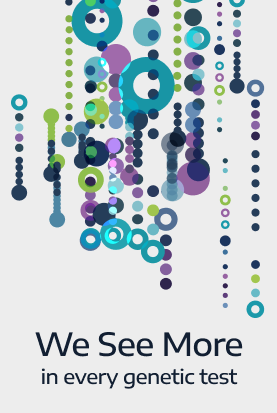Case Studies
We enable precision medicine, one person at a time
Through our testing we aim to provide clear and empowering information for patients. Information that can lead to precise therapies, medications, and management. Oftentimes we uncover information missed by other genetic tests, or that would typically be found only after a time-consuming and expensive series of iterative tests.
Below are just a few examples of cases where our comprehensive testing provided answers when others couldn’t.

- Missed By Others, Detected By Us
- First-Line Testing, Lighting Up the Undetectable
- One Test, Dual Diagnosis
Missed By Others, Detected By Us
Genomic Unity® – DMD inversion provides genetic diagnosis, enabling access to treatment options
Genomic Unity® – DIP2B repeat expansion explains developmental delay and symptoms of chronic functional disease
Genomic Unity® – Heterozygous gene deletion explains clinical Diamond-Blackfan anemia diagnosis
Genomic Unity® 2.0 – UPD and aberrant methylation confirm clinical Prader-Willi syndrome diagnosis
Genomic Unity® – Deep intronic variant explains progressive myopathy
Genomic Unity® – Two exon TLK2 deletion explains global developmental delay and failure to thrive
Genomic Unity® – Elusive KLHL40 3’-UTR second variant explains congenital nemaline myopathy
Genomic Unity® – Compound heterozygous variants in an sncRNA explains multisystemic symptoms
Genomic Unity® – Partial exon deletion explains clinical Rett syndrome diagnosis
Genomic Unity® – Single exon PEX1 deletion confirms suspected Zellweger spectrum disorder diagnosis
Genomic Unity® – Biallelic FGF14 expansions explain progressive gait imbalance
Genomic Unity® – SNV in perinatal lethal gene explains suspected Joubert syndrome diagnosis
Genomic Unity® – Partial exon deletion plus deep intronic SNV explains juvenile parkinsonism
Genomic Unity® – Heteroplasmic mitochondrial deletion explains multiorgan dysfunction
Genomic Unity® – Compound heterozygous FXN variants explain progressive gait disturbance in 39-year-old female
Genomic Unity® – Inversion explains developmental delay and physical anomalies
Genomic Unity® – Overlapping 1bp and 7bp indels in COL18A1 explain retinal symptoms in 11-year-old male
Genomic Unity® – Trans splice variants explain suspected skeletal dysplasia in newborn female
Genomic Unity® – Compound heterozygous mobile element insertion and SNV explains progressive dysphagia in 42-year-old male
Genomic Unity® – Single exon deletion explains epilepsy and developmental delay
Genomic Unity® – Single exon deletion explains intellectual disability
IriSight® – Compound heterozygous sequence variants explain hydrops fetalis in 2nd pregnancy loss
IriSight® – De novo indel explains hypoplastic left heart
IriSight® – Single exon deletion explains multiple congenital anomalies
IriSight® – Compound heterozygous deletion plus SNV explains multiple fetal anomalies
IriSight® – Partial DOK7 deletion plus small indel explains multiple fetal anomalies
IriSight® – Elusive RBM8A 3’-UTR variant explains TAR syndrome features
First-Line Testing, Lighting Up the Undetectable
Genomic Unity® – Biallelic RFC1 expansion confirms clinical CANVAS diagnosis in 70 year-old-male
One Test, Dual Diagnosis
IriSight® – Dual diagnosis explains phenotypes in male fetus
IriSight® – Compound heterozygous deletion plus SNV explains multiple fetal anomalies
Want similar results for your patients?
Connect with a Clinical Specialist to find out how easy it is to bring the power of whole genome sequencing into your practice.

